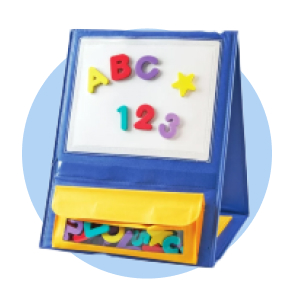
The Path to Better Business Goals
How and why to set goals
As a small business owner, you will likely experience both the thrill of victory and the agony of defeat. That’s just a natural part of doing business. So is learning how to embrace and celebrate the ups while learning from the downs. One simple way to approach both is to set goals.
Goal-setting will help you visualize where you want to be and what you want to achieve. At the same time, it can help you avoid setbacks by giving you a consistent vision of what success means.
At Walmart Business, we understand that business owners may need help setting goals. Here’s what we know about the importance of goal-setting and how to set achievable goals.

Why set goals?
Growing a business without setting goals is like throwing darts in the dark: It’s awfully hard to hit your targets.
Start by defining what success means for your business. How much growth do you want to see? How many clients or what kinds of projects do you want to bring on? Reflecting on where your business stands and where you want it to be will help you hone in on goals that make the most sense.
Beyond giving you a clear target, goals have several additional benefits:
Focus
Setting a goal gives you a clear destination and helps you save time on projects or pursuits that will not contribute to achieving it. When you have a clear destination in mind, you can make decisions based on whether or not they get you closer to it.
Motivation
Setting goals can boost morale. Why? Most employees want to feel like they are a part of something and that they are contributing to a company’s success. According to a recent study, employees at businesses that set goals are 3.6 times more likely to be committed to their business and 6.7 times more likely to be proud of it.
Without clear goals, it can be hard for employees to understand how their work contributes to the company’s growth. A clearly defined goal helps employees see a direct line from their daily efforts to the company’s success.
Measurable results
Setting goals also helps you know when you’ve accomplished something. After all, if you don’t know where you’re going, how will you know when you get there?
This is where it helps to have goals tied to measurable key performance indicators (KPIs). This could be as simple as increasing revenue by X amount or adding Y new clients. Or you could set goals based on more discrete aspects of your business, like the performance of your website or specific advertising campaigns. The more detail you can provide, the better you’ll be able to track your progress.

How to set goals
So that’s why it’s important to set goals. Now let’s talk about how to set them.
Write them down
Studies show that people who write their goals down are actually 42% more likely to accomplish them. Committing goals to paper (even the digital kind) can help you visualize exactly what you are trying to achieve and begin the process of outlining the steps you need to take to achieve it.
Writing down goals also encourages you to record each small success. It can be easy to lose sight of the little victories when you’ve got your eyes on the bigger prize, but they’re just as important to recognize.
Having a written record of your goals is also a great way to hold yourself accountable. There’s no wiggle room when it’s all in black and white, no shifting of the goalposts. It’s there for you—and everyone else in your business—to see.
What kinds of goals to set
While goals like “be better” are inspiring, they’re hard to track progress against. It’s much better to clearly define what you’re trying to achieve; crafting SMART goals is a great way to do that.
SMART stands for:
Specific: Be as specific as possible. The more detail you can provide, the better able you will be to focus on actionable steps and measure your progress.
Measurable: Setting goals that are measurable will help you keep track of your progress. State your KPIs and keep track of them.
Achievable: Goals should be ambitious but not so aspirational that they’re unrealistic.
Relevant: What will accomplishing your goal mean for the business? Focusing on solving an existing problem will help you create goals that will have an immediate impact.
Time-Bound: Make sure to set a deadline. “Grow the business by X over the next Y months,” for example. This will help you keep everyone (including you) focused because you’ve given them a sense of immediacy.
Plan the first step
Once you have a clear, actionable goal established, it’s important to plan your first step. What can you do to move your business toward that goal right now?
The first step doesn’t have to be huge; in fact, it will probably be easier to get going if it isn’t. Smaller goals are easier to achieve and can give you the momentum you need to keep moving forward.
Download the guide
Don’t wait. The key to setting successful goals is always moving toward what you want to achieve – that starts now.
Download our free guide, The Path to Better Business Goals. You will find tips for setting goals and helpful worksheets for reviewing them and evaluating your progress. Click here to download the guide now.












